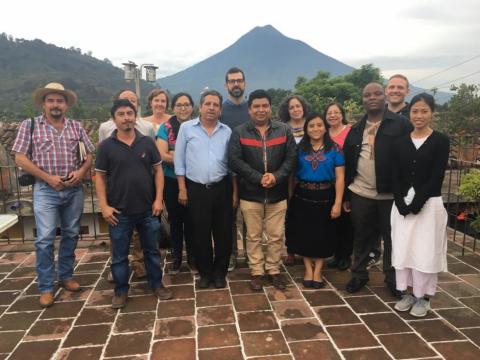
Evolving the System of Solidarity
On 8-11 July 2019, ESCR-Net members met in Antigua Guatemala, Guatemala to discuss the approach of ESCR-Net in the protection of human rights defenders (HRDs). The meeting was convened by the System of Solidarity Advisory Group and hosted by Consejo de Pueblos Wuxhtaj. It included representatives from ESCR-Net members Front Line Defenders, Just Associates (JASS) and Proyecto de Derechos Económicos, Sociales y Culturales (ProDESC) as well as remote participation from Association of Environmental Lawyers of Liberia (Green Advocates) and World Organisation Against Torture (OMCT). For the first three days of the meeting, 8-10 July, SOS Advisory Group members were joined by invitees from Abahlali baseMjondolo, Asia Indigenous Peoples Pact (AIPP) and Egyptian Initiative for Personal Rights (EIPR) who brought additional relevant experience and perspectives.
The System of Solidarity is ESCR-Net’s mechanism to support members and their close partners under threat and to undertake urgent actions to challenge imminent human rights violations. Through the SOS, the network harnesses the collective voice and strength of members across working groups to stand in solidarity with each other in times when HRDs working to advance economic, social and cultural rights are facing attacks as a result of their action in defense of human rights.
Objectives
The meeting aimed to:
- Build shared analysis regarding systemic drivers behind the repression of HRDs,
- Strengthen proactive advocacy to reinforce the “right to claim rights,” via ESCR-Net’s existing working groups and projects, and
- Refine ESCR-Net’s model of work for HRD protection by assessing current practices, exploring new approaches, deepening member engagement and further defining the network's unique contributions to the wider field.
Summary of proceedings
On the first day, members identified trends affecting HRDs globally and reviewed the current scope of the System of Solidarity (SOS), in light of existing working groups and projects already established within ESCR-Net, many of which suggest potential connections with the SOS. Participants reviewed the Common Charter for Collective Struggle, which, among other common conditions, identifies deepening repression as shared challenge facing human rights defenders around the world.
The second day was dedicated to analyzing systemic drivers behind attacks on HRDs deepening a shared analysis of the global forces that drive violence and threats against activists that challenge powerful interests that are threatened by the defense of human rights. At the end of the day, we were joined by three human rights defenders from La Puya, in the interior of Guatemala, who shared their experiences contending with extractive projects in their territories as well as the resulting repression of their communities when they mobilized to oppose problematic mining and hydroelectric projects.
In the third day of the meeting, participants critically assessed conventional protection practices (understood as practices that require external intervention such as protection grants, relocation of HRDs etc.) and explored alternative, community-based self-protection approaches, gleaning recommendations for the future the direction of the SOS.
The fourth and final day of the program, members of the SOS Advisory Group evaluated discussions that had taken place in the previous days of the meeting and made some decisions regarding the future of ESCR-Net’s System of Solidarity.
Conclusions and next steps
The Advisory Group to the System of Solidarity concluded that the SOS encompasses important actions aimed at protecting human rights defenders and offered suggestions to improve the effectiveness of its reactive work. Participants underscored the importance of any action taken within the SOS to highlight connections between attacks suffered by human rights defenders and the ongoing work they do every day to advance and defend human rights.
Participants all generally agreed that examining structural drivers behind the attacks against human rights defenders is strategic and may inform future proactive actions that would confront some of these root causes, including aspects of the current economic model that rely on dispossession, impoverishment, inequalities and repression to sustain itself. This analysis has reaffirmed the importance of deepening collaboration with established working groups and projects across ESCR-Net to ensure that all aspects of the network’s collective work advance protection for human rights defenders and leverage the collective capacity of members to create an enabling environment for the defense of human rights.
